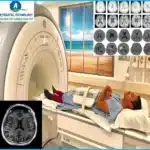Normal Brain MRI Images
“Have you ever been curious about what a normal brain looks like on an MRI? It’s intriguing to consider the complexity and sophistication of our brains, and having a sharper image can help us appreciate how incredible they are. In this blog article, we’ll look at several typical brain MRI scans and talk about what makes them special. Whether you’re interested in neurology or just want to see some interesting images, keep reading to find out more.”
Normal Brain MRI Vs Abnormal
A typical brain MRI reveals the brain structures in their entirety. A brain MRI that is abnormal may reveal indications of a brain tumor, aneurysm, or other abnormalities.
To detect any anomalies, brain MRI pictures are often compared to age-matched reference scans. Changes in the form, size, or texture of brain regions can be recognized as abnormalities, as can signs of a tumor or lesion.
Article About:- Health & fitness
Article About:- Medical Technology
Article About:- Sports

Normal Brain MRI T2
A typical brain MRI T2 is a type of brain scan that produces precise pictures of the brain using magnetic resonance imaging (MRI). This scan is frequently used to identify brain illnesses like dementia, Alzheimer’s, and stroke.
T2 MRI scans can reveal structural abnormalities in the brain, such as tumors, lesions, and cerebral atrophy. It can also detect changes in water content as well as fluid flow between brain cells or other structures. Typically, the scan is performed with the patient reclining on a bed within a huge magnetically charged tube. Radio waves are aimed to the patient’s head throughout the operation to obtain cross-sectional pictures of the brain. A radiologist examines the photos to search for any anomalies.
Normal Brain MRI side View
A normal brain MRI side view should show the cerebrum, cerebellum, and brainstem. The cerebrum is the largest part of the brain and is responsible for higher functions such as thinking and planning. The cerebellum is located below the cerebrum and is responsible for coordinating movement. The brainstem connects the brain to the spinal cord.
On the MRI side view, you should be able to see the lateral ventricles and sulci. The lateral ventricles are fluid-filled spaces in each hemisphere of the brain that contain cerebrospinal fluid. The sulci are folds and grooves in the surface of the brain that divide it into distinct lobes.
Normal Brain MRI Sagittal
Normal brain MRI sagittal images showing the brainstem, cerebellum, and pituitary gland in longitudinal section. The cerebral hemispheres are divided into white matter (WM) and gray matter (GM), and the WM appears as a series of parallel bands. The GM is organized into distinct lobes: the frontal, parietal, temporal, and occipital lobes. The lateral ventricles are visible in all the four quadrants of the brain.
Normal Brain MRI Anatomy
The brain is a complex organ, and MRI enables us to see its intricate details. A typical brain MRI should show various parts of the brain, including the cerebral cortex, cerebellum, and brainstem. The cortex is the outermost layer of the brain, and is responsible for higher cognitive functions such as language and decision making. The cerebellum is located below the cortex, and coordinates movement. The brainstem sits at the base of the brain, and controls basic functions such as breathing and heart rate.
Normal Brain MRI Images With Contrast
The majority of patients will undergo a standard MRI of the brain with contrast. That is, the photos depict the brain in its native condition. The contrast agent helps to emphasize certain parts of the brain, which can aid in the diagnosis of certain disorders.
Typically, the contrast agent is injected into an arm vein and subsequently goes to the brain. It appears as a bright white spot on an MRI, allowing clinicians to more precisely define regions of damage or illness. The pictures can also assist in the identification of regions of inflammation or infection, malignancies, blood vessel obstructions, hydrocephalus (extra fluid in the brain), and other abnormalities.

Frequently Asked Questions
What is a normal brain MRI?

A brain MRI (magnetic resonance imaging) scan, also known as a head MRI, is a non-invasive process that generates highly detailed pictures of the structures within your head, most notably your brain. To get extremely comprehensive images, MRI employs a huge magnet, radio waves, and a computer. It does not make use of radiation.
What do abnormalities look like on a brain MRI?

A brain lesion is an abnormality discovered during a brain imaging test such as magnetic resonance imaging (MRI) or computed tomography (CT). Brain lesions appear on CT or MRI images as dark or bright patches that do not appear to be normal brain tissue.
Are white spots on brain MRI normal?

When your white matter is destroyed, it generates white matter lesions, which healthcare practitioners may “see” on magnetic resonance imaging (MRI) of your brain as bright patches. Some white matter lesions do not cause symptoms and might be deemed “normal” with age.
How do you read an MRI of the brain?

How to Interpret a Brain MRI. The brain MRI examination should be performed in a methodical manner, beginning at the midline and moving laterally. Thus, brain MRI study should begin with the ventricles and go to the surrounding subcortical structures, brain lobes, cerebral cortex, meninges, and skull.
Which MRI is best for brain?

T1-Weighted MRI is the standard imaging test and is included in all routine MRI exams. It gives clinicians a good picture of brain anatomy and structure. It can also reveal damage in brain injury, although usually only when the damage is severe.
Does MRI show a healthy brain?

To evaluate if a tissue is healthy, the radiologist examines the size and distribution of these bright and dark patches. Figure 1 shows the head and neck. Brain tumors, traumatic brain injury, developmental defects, multiple sclerosis, stroke, dementia, infection, and the causes of headache can all be detected with MRI.




